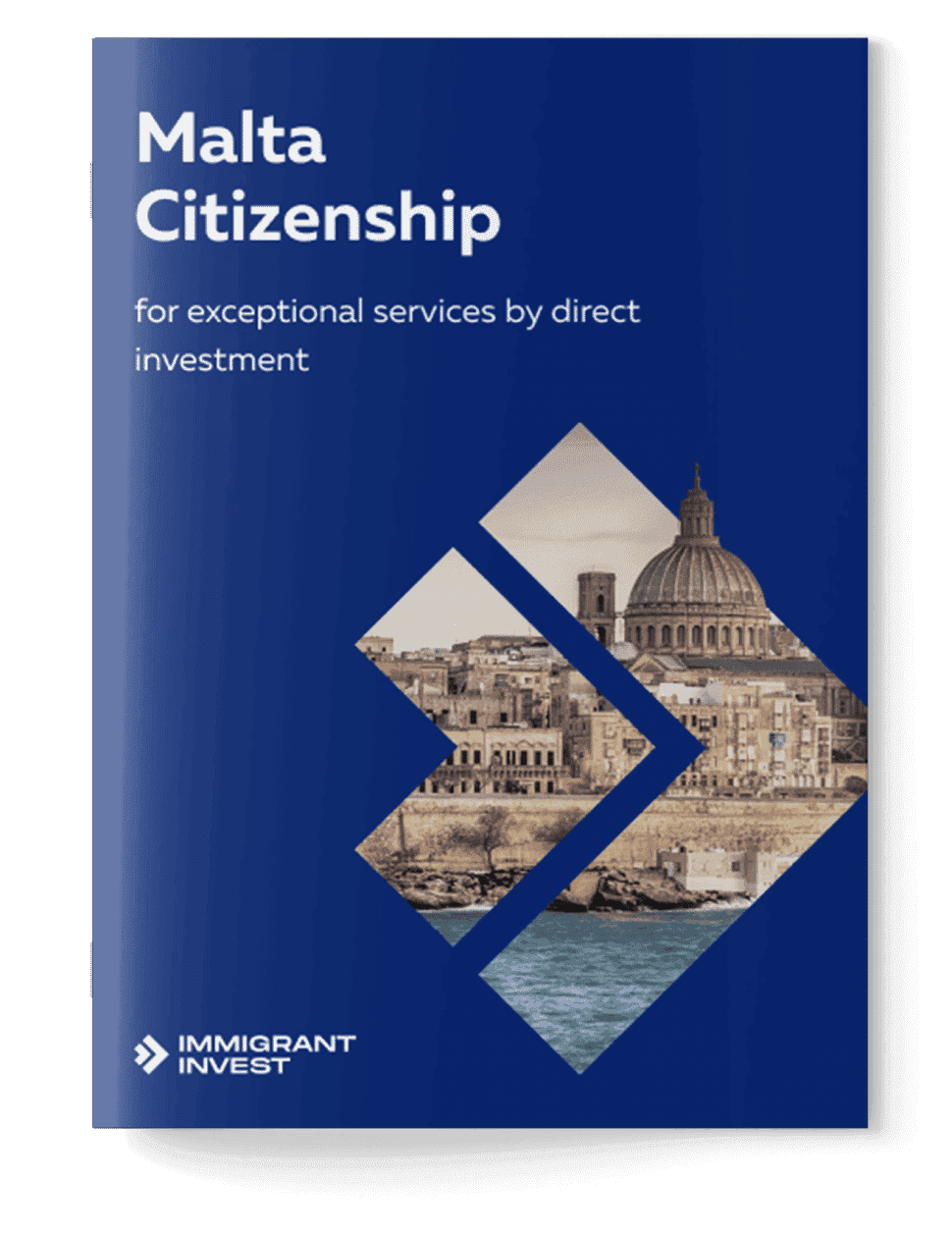Moving to Malta: what are the benefits of Malta investment immigration
The main reason wealthy people choose Malta for immigration is an opportunity to move to one of the EU countries in several months. For example, obtaining a residence permit under the Global Residence Programme takes 3—4 months. In comparison, getting a residence permit in France, Germany, or The Netherlands may be much more difficult.
To move to Malta, wealthy foreigners may take advantage of immigration programmes: Malta Global Residence Programme and Malta Permanent Residence Programme. They allow obtaining a residence permit and permanent residence, respectively. Investors can also apply for citizenship by naturalisation for exceptional services by direct investment.

Author •Julia Loko
Explained what to do to move to Malta

Moving to Malta: what are the benefits of Malta investment immigration
How to immigrate to Malta by investment
An investor interested in Malta immigration must be a well-to-do person over 18 years old without convictions or visa refusals. They can confirm the legality of income and financial viability and are ready to fulfil the program’s conditions.
Investors can obtain a residence permit in Malta for an investment of around €30,000, including renting a home and paying taxes annually. Permanent residence can be obtained after an investment of €150,000 or more. Citizenship is granted to investors who had a residence permit for three years and invested at least €690,000. If the investment amount is higher, citizenship may be granted after a year of residence.
Comparison of conditions for the investors: Malta residence, PR and citizenship
Receiving Malta citizenship is the most expensive and time-consuming of all the options. It also requires investors to have a residence permit in Malta for one or three years beforehand. Still, it is quite a benefit: with a residence permit, you may live in Malta and travel visa-free to the Schengen Area.
To apply for a residence permit, permanent residence, or citizenship, an investor needs the help of a licensed agent experienced in Malta investment immigration.
Aside from the investor, family members can also get a residence permit or citizenship. This includes spouses, children, and parents. Children over 18 and parents must be principally dependent on the investor. Age restrictions also depend on the status the investor applies for.
Family members who can obtain a status
Benefits of Malta residence permit or citizenship
Wealthy people choose Malta investment immigration to gain freedom of travel, develop international business and find a favourable tax regime. Additionally, a Malta residence permit or citizenship allows you to enter the country even in conditions of closed borders.
Key benefits of the Maltese statuses
Also, the Malta Global Residence Programme is the most affordable path to a residence permit for investors: the minimum investment amount is about €30,000, including the rent of an apartment and an annual tax.
How to get Malta citizenship for exceptional services by direct investment
Malta citizenship can be obtained only by naturalisation. For that, an individual must have a residence permit and live in Malta for a particular time.
Wealthy people can apply for Malta citizenship by naturalisation for exceptional services by direct investment. The process consists of several essential steps.
Preliminary Due Diligence. Investors must turn to licensed agents to apply for Malta citizenship. The agent conducts a preliminary Due Diligence: they check the information about the applicants through law and business databases and on the internet. Based on these data, a licensed agent concludes whether it is possible to get Malta citizenship or if it’s better to choose another option.
Police clearance. The police check all the applicants over 12 against the Europol and the Interpol databases.
Gathering of all required documents. At this step, a licensed agent’s lawyers help the investor collect the necessary documents for a residence permit. Also, the investor needs to rent or buy a property and get health care insurance.
Biometrics. An applicant needs to come to Malta to submit biometrics. It must be done no later than six months after the police clearance. After that, the applicants submit the documents for a residence permit.
Collecting residence permits. They are issued 14 days after the application is submitted. The residence permit is valid for 36 months.
Gathering and submitting documents for the Eligibility Test. The application must be submitted within 12 months after receiving a residence permit.
Eligibility Test is a Due Diligence check. The applicants’ biography, business and origins of funds are strictly checked. The Eligibility Test lasts for about 120—150 days. If the application is approved, investors apply for citizenship.
Fulfilling all the conditions. This includes an investment of €600,000—€750,000 to a state fund, a donation of €10,000 to the charity, and renting or buying property. An applicant must also prove their connection to Malta, and living there for some period of time is the only way to do it.
Biometrics and taking oaths. It must be done within six months after receiving approval from the Minister.
Collecting passports in Malta. The passport can be collected in the passport department of Malta four days after submitting biometrics.
Requirements for ordinary naturalisation are different and depend on each case.
Due Diligence process in Malta
Each investor interested in immigration and living in Malta must undergo Due Diligence. Maltese checks are one of the most strict and meticulous in the world. They consist of four steps.
Preliminary Due Diligence by the licensed agent. The agent checks all the documents provided by the applicant and tries to foresee the questions that can arise during the primary Due Diligence. Lawyers attach required documents to answer them. Then all the documents are sent to the department responsible for granting residence or citizenship.
Main Due Diligence by the government department responsible for permanent residence or citizenship. The government department starts a deep examination of all the submitted documents and the applicant’s personality. It checks the reputation of the investor and their family members and looks for any instances of visa, residence permit, or citizenship rejections. It also examines the sources of wealth belonging to the applicant.
The department submits a request to the licensed agent if it needs additional documents. It retards the process. Therefore, it is essential to submit all the necessary documents at once.
To make a decision, the department must receive conclusions from international organisations and independent companies.
Due Diligence checks by Interpol and Europol. Interpol and Europol confirm that the applicant has no criminal records and is not prosecuted in any country. They submit their conclusions to the department responsible for citizenship.
Due Diligence checks by international compliance specialists. International compliance specialists from independent companies look through the applicant’s biography and check their documents one more time. Then they send their conclusion to the department responsible for citizenship.
Due Diligence risk factors
Several factors can put an application at the risk of not being accepted. They include:
Identification. Some countries of origin may put an applicant at the risk of denial, for example, China, Kazakhstan or Arab states. The examiners also check in which countries the applicant resided before.
Business and corporate affiliations. The examiners consider the type of business and industry it is working in. Some of them are examined more strictly than others: for example, those producing gas and oil or making cryptocurrency investments.
Political exposure. The applicant is at the risk of denial if they were a politician or civil servant or were under sanctions.
Legal and regulatory matters. The examiners check whether the applicant has a criminal record or has participated in trials.
Reputation. This category requires checking whether any negative information about the applicant is circulating on the Internet or in the media.
Some risks may be neutralised if the submitted documents provide complete and transparent information on the applicant and their income. If you want to find out if you can pass the Due Diligence successfully, please answer ten questions in our test to find out the main points of the check and evaluate your chances.
Discover your path to Maltese citizenship
Schedule your online meeting today.

Investment programs expert
Other ways to immigrate to Malta
You can get a residence permit without investment, but only a residence permit by investment would not oblige you to move to Malta.
At the same time, renting or purchasing housing must indicate the registration address for any residence permit.
Non-investment ways to obtain a residence permit in Malta:
Employment. Malta immigration for skilled employees requires a contract or a job offer from a Maltese company.
Education at a university. A student residence permit is issued based on a study agreement concluded with the university.
Family reunification. This type of residence permit can be obtained if the applicant’s spouse or other close relatives are citizens of Malta.
Marriage. A spouse of a Maltese citizen can obtain a residence permit.
Birth and descent. An individual can obtain a residence permit by birth or descent if they were born in Malta or their mother or father was a citizen of Malta at the time of the individual’s birth.
Business. To profit from a Malta business immigration, an applicant must register a company with the required share capital.
Refugees and political asylum. Those seeking asylum must prove that it is dangerous for them to stay in the country of their former residence.
From the moment of obtaining a residence permit, it is necessary to comply with the Malta immigration requirements of not living in the country for more than 183 days a year. As a result, the applicant becomes a tax resident of Malta.

St Julian’s is a coastal town in the central region of Malta. It is popular among tourists, and some foreigners choose it for residing when they get a residence permit
Tax conditions in Malta for individuals with dual citizenship
wage, salary and other income received from labour activity;
profit from business activities;
dividends, interest, royalties and other investment income, including rental income;
pensions and regular receipts.
There are no taxes on property, but if you decide to sell it, you would need to pay a 5 to 8% tax.
The income tax rate depends on the individual’s total income and marital status. It may vary from 0 to 35%.
Income tax rates in Malta for unmarried people
Income tax rates in Malta for married people
Income tax rates in Malta for people with children
Malta has double tax avoidance agreements with 81 countries; Egypt, India, Morocco, and many others are among them. These agreements help individuals with dual citizenship avoid double taxation on their income.
If you want to obtain a residence permit or citizenship in Malta but cannot decide on the program, please contact Immigrant Invest. Our experts will carefully study your situation and offer the best solution for your tasks. Immigrant Invest provides full legal support from the start until the return on investment.
Immigrant Invest is a licensed agent for citizenship and residence by investment programs in the EU, the Caribbean, Asia, and the Middle East. Take advantage of our global 15-year expertise — schedule a meeting with our investment programs experts.
Frequently Asked Questions
Case studies

Malta permanent residence to relocate to a calm EU country and improve English language skills

Visa-free entry to the US and the UK with Malta citizenship

Malta citizenship for a Taiwanese family so that their children get prestige education





















